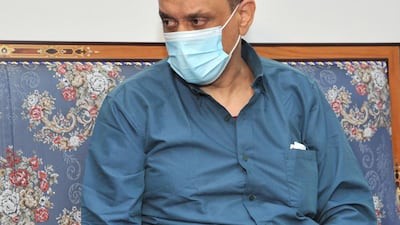Six Americans kidnapped by Houthi rebels in Yemen are suing the militia’s state sponsors, Iran, for their detention and torture that left one victim with injuries likened to those sustained in a high-speed motorbike crash.
Legal papers filed by a law firm in Virginia contain graphic details of beatings, whipping with wires and inadequate medical help at a political prison, the National Security Bureau, in the capital Sanaa, where all six are thought to have been held over periods from 2015 to 2020.
The six say that a reason for them being taken was for the Iran-backed Houthis to secure ransom payments for their return but while they were held – sometimes in solitary confinement – they were attacked by guards and other prisoners.
One of the six, freelance journalist Casey Coombs, was badly beaten in 2015 by two cellmates who were given wooden clubs and told to carry out the attack by their guards, court documents say. He was left with severe injuries that required nine hours of surgery after he was flown to the US via Oman for surgery to save his life and avoid paralysis after 17 days in custody.
"The surgeons compared the severity to what could be expected from a high-speed motorcycle crash or falling several storeys," said his court claim.
The six suing Tehran include businessman Mikael Gidada and former aid worker Sandra Loli, who were released in October 2020 as part of a prisoner swap for 283 Houthi fighters, US court documents say.

The pair and their families are claiming more than $380 million in a second tranche of claims first brought by a law firm in September last year. Mr Coombs is part of a group of four who were all kidnapped in 2015 and have claimed nearly $700m against Iran in a case launched in 2019.
The six are able to sue Iran in the US as it is one of four countries currently designated a state sponsor of terrorism – along with Cuba, North Korea and Syria – where normal immunity for nations does not apply.
The case builds on a successful legal claim by the law group, Singer Davis, after two Americans, John Hamen and Mark McAlister, were taken hostage in 2015. Hamen was subsequently killed by his captors while Mr McAlister was freed after more than six months.
Mr McAlister and the two men’s families were awarded about $84m in compensation and $169m in damages designed to punish Iran – but the difficulty lies in collecting the money from Iran.
“That’s obviously a long shot,” said Kevin Hoffman, a lawyer for the six. “We don’t expect to stumble on Iranian money we are hoping to collect.”
In the Hamen case, they have claimed about 6 per cent of the compensatory damages so far from a state-backed pot for victims of terrorism, funded in part from penalties paid by sanctions-busters in the US.
A similar process is likely to be followed if they win judgment for the six. Iran is served papers through Swiss intermediaries but does not send lawyers to contest the claims.
Mr Gidada, who had interests in mining, export and water bottling industries, was unable to flee after the Houthi takeover of Sanaa. His business partner was killed by the Houthis in March 2018.
The following month, Houthi soldiers turned up at his home to arrest him before blindfolding, handcuffing and striking him repeatedly with guns when he shouted for help.
He was held in a brightly lit cell for 899 days where the light was kept on at all times and was allowed only three calls to his family during that time.
He counted 39 interrogations for up to 12 hours during which he was told he would die in prison unless he admitted to spying on behalf of the US and Israel. He was also threatened with being put in a cell with members of ISIS and Al Qaeda.
“During some of the interrogations, Mike was forced to do hard physical exercises, such as squats, while lifting heavy objects and being whipped with an electrical wire,” court papers said.
“He was once forced to drink a gallon of water as quickly as possible right before one of these sessions.”
Mr Gidada suffered a stroke two months after his release and was diagnosed with diabetes and high blood pressure.
“These conditions came about as a result of his treatment in captivity at the hands of the Houthis,” the papers said.
Ms Loli was held in Yemen for 491 days. Her interrogator once showed her “pictures from her son’s high school graduation, forcing her to look at them so she knew what she was missing”, the documents said.


